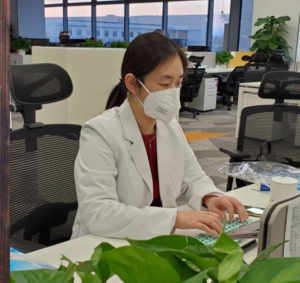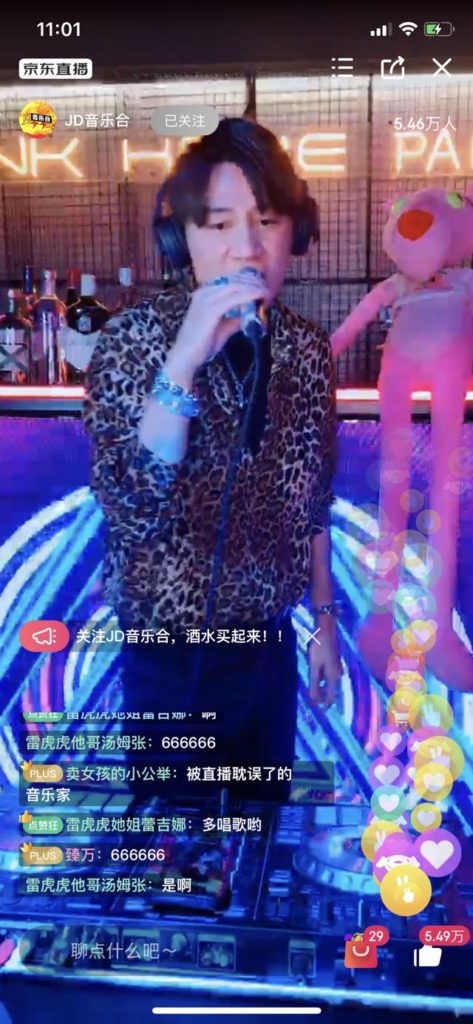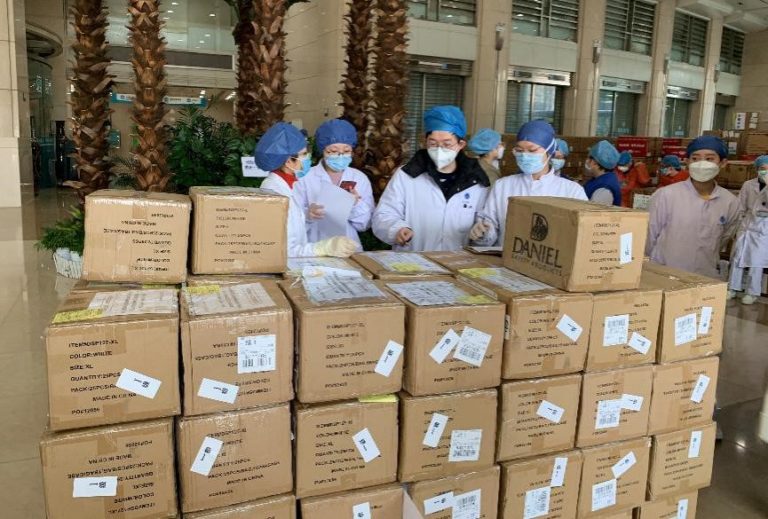This is a testing time for everyone. While China is gradually welcoming the spring, people here continue to wear masks and maintain significant social distancing - if not outright deciding to stay inside and completely avoid all public spaces. People in China have been extremely careful and in general have taken added precautions during the entire period of the COVID-19 epidemic.
While people from around the world are learning about the impact of the virus on their local communities and hankering down to deal with it, the past couple days have seen a rise of interest in what the global community can learn from China. As China's largest retail company, JD.com can possibly add to the conversation about what the company has learned over the past months to share. Here's a summary of reflections.
Stay focused and don't let fear drive decisions
To clarify, not listening to fear is not the same as having license to do whatever one wants. Interestingly, Eastern cultures are more collective by nature, so what is best for the group may take precedent over what is best for the individual. One may argue that this has helped people adopt strict measures, at least from a cultural perspective.
From a business perspective, JD made a fundamental - and perhaps counter-cultural - decision eight years ago to stay open during Chinese New Year. Almost everything shuts down for Chinese New Year. The decision to expand business to cover over 300 cities across China this year was an extension of business as usual. When COVID-19 broke out, JD decided to stay consistent and focused on continuing to provide service - with the utmost precaution - while most closed up shop.
Collaborate for the greater good
With the epidemic outbreak just prior to Chinese New Year, JD took immediate action to organize a team dedicated to ensuring business would continue while coming together to fight COVID-19.
Richard Liu, Chairman and CEO of JD.com, introduced this recently during the company's earnings call on March 2. "In addition to ensuring timely supply and delivery of daily necessities for unmet needs, JD Logistics opened a dedicated channel for relief materials across the country to assist Wuhan."
JD's supply chain - recently recognized by China's State Council as setting the supply chain standard for China's "new infrastructure" - was called upon by the Hubei provincial government to build a supply chain management platform, bringing much-needed emergency supplies to the people at the epicenter of the crisis.

Photo: JD's logistics and supply chain network ensures delivery of much-needed goods across China
Protect your people and those they touch
It cannot be overstated how important it is to protect frontline workers. At the end of December 2019, JD Logistics' monitoring system flagged a significant increase in mask sales in Wuhan. JD Logistics immediately prepared 70,000 masks for its couriers in Wuhan and carried out rapid replenishment and internal alerts. From the very beginning of the outbreak, the company required all delivery couriers on the frontlines across the country to wear masks at all times and to undergo regular temperature checks. Other supplies such as gloves and disinfectant were made available, and packages were disinfected before being passed to customers.
Most apartment compounds stopped allowing outside visitors during the height of COVID-19, meaning that instead of delivering directly to the door, as they usually would, JD couriers were only able to deliver to customers from outside the compound in most cases. The company took a further step by offering a handful of contactless delivery methods such as setting up mini delivery stations outside of apartment compounds, where customers could pick up their packages themselves. Customers who place an order during the virus period would receive a notice urging them to use the self-pickup lockers.
An employee and customer-first mindset drove the response to the virus. One aspect of this is price stability. JD's supply chain team took measures to monitor any abnormal pricing on its platform and to address it accordingly. The company also partnered with the market supervisory body in Beijing and four e-commerce players to launch an information sharing platform targeting this type of merchant behavior during the outbreak. Together with Alibaba, Pinduoduo, Suning and Weidian, the company pledged to fight against violations such as price hikes, false advertising, and sales of counterfeit goods. Anyone who violated the rules on one platform, would be forbidden by the other platforms in which they don't already have a presence.
Roll out the new technology
JD is a complex business with lots of moving parts. While the company has its roots in retail, it's been transforming to be a technology and service enterprise since 2017. With an increasing source of revenue deriving from technology, constantly testing and pushing boundaries with new technology is an important part of this transformation. JD Health, a JD.com business, is the second largest unicorn in the world and a perfect example of a business that is on the forefront of what's new. China's healthcare system has been under significant strain even before the crisis. COVID-19 brought the need for new healthcare solutions front and center. With people across China staying home for prolonged periods of time and in an environment of initial uncertainty, JD Health launched free online consultation services, both for diagnostic medical questions and to provide psychological counselling for people who may have been healthy but felt ill at ease. Tying into popular China marketing approaches, JD Health also held livestream sessions for people to hear from renown experts.

Photo: A JD Health doctor answers queries
Dr. Liu Yafeng, a specialist in respiratory medicine and one of JD Health's online doctors, when referring to the online consultation shared that it "helps prevent masses of people flocking to the hospitals, which stops those with a real need from getting prompt treatment and increases the cross-infection rate at hospitals."
JD Cloud & AI rolled out a smart epidemic assistant in early February which empowered people with knowledge about the virus. Based on the existing universal smart conversation platform, the platform integrates the latest technology to discern the user's intentions and matching them with the subsequent knowledge. The business group also launched a cutting-edge smart body temperature screening system to time for right when people were returning from their home towns and to work. Equipped with infrared technology that identifies temperature spikes easily amongst large groups of people, the technology addresses both public health concerns as well as makes movement much more efficient.
Probably the technology which garnered the most attention from JD regarding supporting the fight against COVID-19 was how the company deployed contact-free delivery via autonomous robot and drones. Autonomous robots were employed right at the epicenter to deliver products to hospitals in Wuhan as well as to deliver packages to residential compounds for people who were under quarantine in Shenzhen. Meanwhile, in the far north of China, drones were employed to disinfect residential areas that are hard to reach, in Inner Mongolia, enabling people to emerge more safely when quarantine rules relaxed.
Tweak the supply chain
COVID-19 has brought unprecedented challenges to the retail supply chain in China. For one, in ordinary times the demand for masks, hand sanitizer, and soap, and other protective supplies is traditionally low. So, not only is the level of inventory in warehouses low, but also, more importantly, the level of production is low. With a crisis situation like COVID-19, the demand shoots up dramatically, both online and offline, leading to stock outs. Ultimately supply needs time to catch up with demand, but in the meantime, it is critical to allocate products so that they can be used most effectively. JD-Y's smart supply chain team used an algorithm to predict the spread of the virus across China and to allocate inventory effectively. At the same time, seeing the skyrocketing demand on the platform, the company notified suppliers to dramatically increase production, quickly.
Another phenomenon at work is the shift of demand from offline to online. A classic case of this is fresh food. Although it is becoming increasingly popular in China for consumers to buy fresh food online, in ordinary times, there is still high demand offline. Once people started self-quarantining at home due to COVID-19, the demand for fresh food online shot up dramatically. For the entire month of February, sales of fresh food on JD increased 260 percent year-on-year. With the demand exceeding the available supply online, it was essential to source from offline. This includes helping supermarkets sell their produce online, as well as instituting programs that do procurement from around a customers' location.
Cities that were completely closed off, such as some of the cities in Hubei province, faced the challenge of finding fresh food when they weren't able to leave their apartment compounds. JD provided a three-pronged solution: JD Fresh Basket, which sources food from its own Friends Shop community group buying program; B2C wholesale markets in the area; and, agricultural enterprises in partnership with the local government. Originally launched in Wuhan, the program has already expanded to over 50 cities. For other products where warehouse inventory might not have been sufficient such as rice or oil, JD turned to its Omnichannel Fulfillment program. Omnichannel Fulfillment aims to source products from partnering convenience stores and other offline outlets located closest to customers. When customers place an order on JD, the system will calculate where the product is in stock closest to the customer, and deliver it directly. It effectively allows JD to extend its inventory, enabling more customers to get what they need, quickly.
Source offline for online
With the unprecedented demand online, and offline establishments such as restaurants, movie theaters, and more closed at the peak of the virus, an employment imbalance resulted. Research from China's National Bureau of Statistics shows that in 2019, 15.5 percent of the country's restaurant revenues came from the Chinese New Year peak season, while 93 percent of China's restaurants were temporarily closed due to the impact of COVID-19. Restaurant workers were out of their jobs, but delivery and warehousing and other jobs struggled to keep up with the sheer volume of online orders. JD's offline supermarket 7FRESH created a program to hire workers from these types of establishments for temporary jobs at 7FRESH. JD also partnered with Dada Group to offer 35,000 temporary and full-time positions, of which 20,000 came from JD Logistics, covering positions, such as warehouse workers, pickers, couriers, and drivers.
Several other retailers have followed suit. Amazon announced to hire 100,000 full- and part-time workers to address the surge in demand due to people staying at home. Walmart also announced a plan to hire 150,000 new associates through the end of May to work in stores, clubs, distribution centers, and fulfillment centers. The roles will be temporary at first, but many will convert to full-time over time.
Bring offline online
In China, Chinese New Year is usually prime time for the clothing industry as many people rush off to buy new clothes to usher in a new year. Sales from the end of January to the end of February usually account for 10-15 percent of yearly sales, according to industry insiders. With COVID-19, offline clothing shops quickly closed their doors for a period of time. To help reduce the blow dealt to them, JD used its cloud store solution to help brick-and-mortar clothing store shop assistants to share and sell products with target consumers online. The cloud stores are sourced on WeChat's mini program (app within an app) platform and can be set up quickly. By February 10, JD had already successfully helped 2,096 shopping assistants from brick-and -mortar stores move online during the peak of the virus.
COVID-19 resulted in an abrupt loss of in-person social interaction, as school, work, and other activities went entirely online. With the clubs and bars closed, entertainment also followed suit. JD teamed up with China-based Taihe Music Group and international liquor brands, Budweiser, Rémy Martin, Carlsberg and Pernod Ricard to host a three-hour live show through JD Live and introduce liquor products for viewers to buy with a single click. The program is not only new to JD, but also the first of its kind of these brands to join. So far, it is proving successful. During just one show, sales of whiskey products from a single partner increased eight times compared to the previous day. This speaks to a broader trend where fun-seeking youngsters in the 20s have turned to online versions of traditionally offline activities such as online travel, museum visits and theater performances.

Photo: The JD Live clubbing experience in partnership with Taihe Music Group
Other traditionally offline activities such as sales events and even partnership signings have gone online. Last week, JD signed a partnership agreement with kiwifruit giant Zespri to be the first e-tailer in the world to directly supply from the brand to its consumers. Due to COVID-19 outbreak, the partnership was signed remotely, online.
Be a conduit for giving
Lastly, JD is honored to have an opportunity to empower so many generous companies that have made selfless donations for people in Wuhan and across China. Because JD Logistics was one of the only logistics companies open for business and had unique access and infrastructure in place at the time, it provided a unique opportunity to serve as a conduit for giving. JD Logistics helped deliver a wide range of care from partners and merchants to Wuhan, including masks and medical equipment, massage chairs for medical staff, feminine care products, air purifiers, foodstuffs, and countless others. In addition to acting as a conduit, JD also opened its own resources to give generously across the board – financially, materially, and through preferential programs that protect the interest of merchants, consumers, and society overall.

Photo: JD helps deliver donation of hazmat suits to Wuhan
There's a lot to reflect on now concerning addressing the battle against COVID-19, but it's no time for "told you so" thinking or to point fingers. It’s a particularly challenging time for the world, and the only thing that can be done is learn as much as possible about what may help from others that have been through it. Hopefully, this paints an accurate and helpful picture of that.
(Contributed by Brad Burgess and Ella Kidron, brad@jd.com, ella@jd.com)




 A single purchase
A single purchase









